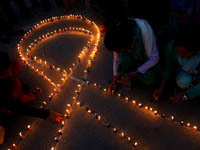Health officials recommend aggressive treatment for HIV patients
 Health officials said Thursday they are recommending that any person living with HIV be offered AIDS drugs as soon as they are diagnosed with the virus, an aggressive move that has been shown to prolong life and stem the spread of the disease. Standard practice has been to have patients put off the expensive pill regimen - which can cost up to $15,000 a year in the United States - until the immune system weakens.
Health officials said Thursday they are recommending that any person living with HIV be offered AIDS drugs as soon as they are diagnosed with the virus, an aggressive move that has been shown to prolong life and stem the spread of the disease. Standard practice has been to have patients put off the expensive pill regimen - which can cost up to $15,000 a year in the United States - until the immune system weakens.
But Health Commissioner Thomas Farley said recent studies have shown that the benefits of early treatment, combined with education and testing, appears to be a promising strategy for countering the epidemic.
"I'm more optimistic now than I've ever been about this epidemic that we can drive our new rates down to zero or close to it - eventually. I don't know how soon. But I'm very optimistic of the direction that it's going to take the epidemic to," Farley said in an interview Wednesday, according to Washington Post.
There are said to be 1,300 people living with HIV in Wales.
Joanne Walker from Wrexham, who was 18 when she was told she was HIV positive, said: "My dad and my sister initially panicked and they became obsessed with the fact that there was some way they might catch it. "At the time they sterilised and bleached everything, and removed razors and toothbrushes from the bathroom. "If I walked round the house bare footed they'd ask me to put shoes and socks on. "I then started to think if that's how my family are with me, how's the rest of the world going to be?"
Another person diagnosed with HIV told the programme how he had been threatened at work, and was forced to move out of his home after neighbours found out about his condition and made him feel unwelcome, reports BBC News.
However, a new technique called dry blood sample testing helps in early detection of the disease and saving lives. Under the new technique a child's blood sample is taken from the heel when the baby is about six-week-old. The blood sample is dropped over a filter paper, dried and sent to the National Centre for Disease Control (formerly known as National Institute for Prevention of Communicable Diseases). Microbiologists examine the sample using polymerase chain reaction to detect the presence of HIV virus. In case the virus is found, the referral centre is asked to send the patient to the nearest Anti-Retroviral Therapy centre for a repeat test using whole blood samples.
Prof AK Tripathi, head of ART centre at Chhatrapati Shahuji Maharaj Medical University, which offers this testing, said, "More than 90% of children born with HIV get virus from their parents. The test would help in saving lives or at least improving the quality of life led by them.", says Times of India.
Yet, numbers give shape to the daily enormity of this pandemic: 34 million living with HIV/AIDS (including 700,000 Americans), 2.7 million new infections last year, 16.6 million orphans.
Today is World AIDS Day. For the past 20 years, I and thousands of others have been lobbying our federal government to ensure that the story of AIDS is told, and is changed. Over those 20 years, we have made progress. The growth of the epidemic has slowed. When, five years ago, the cost of treatment was dramatically lowered to as little as $100 per year, I couldn't keep quiet, informs The Olympian.
Subscribe to Pravda.Ru Telegram channel, Facebook, RSS!




